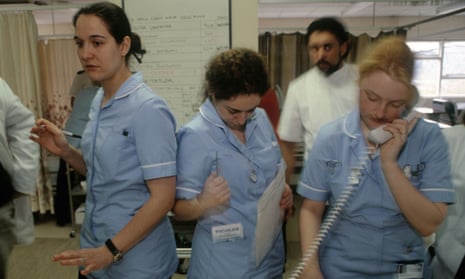Brexit is set to cause a severe shortage of nurses in the NHS, which is already facing a chronic lack of them in many hospitals, research suggests.
Britain’s decision to leave the EU could deprive the health service of nurses from countries such as Spain, Portugal and Ireland, from which it has recruited heavily in recent years, analysis by the Institute for Employment Studies found.
A growing reluctance among EU nurses to come to work in the NHS could pose serious difficulties for hospitals, some of which get as many as 20% of their nurses from the European Economic Area.
The potential of EU nurses could also prove problematic because it would coincide with a spike in demand for care caused by a growing number of over-85-year-olds in the population, putting even greater strain on the NHS, according to the IES.
“The current and projected shortage of nurses has left the NHS nursing workforce in England particularly vulnerable to any disruption to its recruitment pipelines, both from the EEA and outside of it,” says the study, which was led by Dr Rachel Marangozov.
“Whatever form Brexit eventually takes, it could well lead to a reduced supply of labour from the EU. Given the current uncertainty around the status of EU workers, many EU nurses may voluntarily choose not to take up positions in the UK, while those already working here could make plans to return home if they feel unwelcome or no longer see a future in the UK.”
Non-UK EU nurses make up almost 5% of the total NHS nursing workforce in England. Hospitals in London, the Thames Valley and east of England will be hardest hit by EU nurses no longer coming to Britain because they rely so heavily on them, the IES says.
For example, 20.3% of nurses at the Royal Brompton and Harefield specialist heart and lung trust in London are from the EU, as are 18.4% of nurses at Queen Elizabeth Hospital in King’s Lynn in Norfolk and 15.4% at Papworth, another heart and lung centre of excellence, in Cambridgeshire.
Jeremy Hunt, the health secretary, and NHS leaders have voiced deep unease about Brexit potentially exacerbating the existing big gaps across the health and social care workforce and have praised EU nationals’ contribution to the NHS in an effort to persuade them to stay.
The Royal College of Nursing said the findings showed that problems in nurse recruitment could reach “catastrophic proportions”. It said the NHS was facing a perfect storm of an ageing population and growing need for healthcare coinciding with Brexit and fewer nurses being trained at British universities in the wake of the government deciding to axe bursaries for student nurses.
Applications to study nursing are down 20% for next year. “Coupled with the effects of Brexit, this may become a double whammy for the nursing profession which could make NHS services nigh-on impossible to sustain,” said Stephanie Aiken, the RCN’s deputy director of nursing.
“Patients can be put at risk when there are too few staff,” she added. She called the big drop in nursing degree applications “a very worrying situation that could cause the staffing crisis to deteriorate pat the point of no return”.
A spokeswoman for the Department of Health said: “As the health secretary has repeatedly made clear, overseas workers form a crucial part of our dedicated nursing workforce. They are a crucial part of delivering safe staffing in hospitals, and we want to see their outstanding work continue as we meet the needs of a changing population.”
She said there were plans to train more homegrown nurses, with 51,000 nurses currently in training, to help deliver the government’s promised “truly seven-day NHS” by 2020.









Comments (…)
Sign in or create your Guardian account to join the discussion